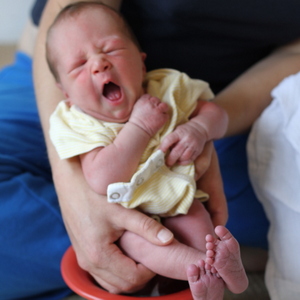- Baby Pottying

What is baby-led potty training?
What is Baby-led Pottying?
It's The Answer to All Your Nappying Woes!
It's the natural way to do things and it makes everyone feel good.
You're happy because it gives an uplifting feeling of connection and confidence.
Your baby is happy because they have a rash free bottom and comfortable tummy (which will make you feel happier still)
Your toddler is happy because they'll need fewer nappy changes and be given independence. (happy toddler, happy parent, right?); and
The planet is happy because you'll be better placed to reduce landfill.
Plus, you won't have to worry about blowouts, you'll save money, you'll never have to dread nappy changes, your tot will be in pants as soon as they're capable, and your relationship will be strong one.
Sounds Great! But... What is Baby-led Pottying?
Simply put, it's using a potty rather than a nappy. From birth.
Which isn't as strange as you might think.
Humans have been around for a long time - 50,000 years in our modern form - but washing machines and disposable nappies only really took off in the 1970s (and even now, most of the world's population don't have either).
So you see, we evolved to manage without nappies and people everywhere did just that (or at least strived to minimise washing) until very very recently.
You can't undo evolution with 40 years of cultural change! Your instincts and emotions have 400,000 years of experience, and your child inherits all that too.
For example, babies (in common with many animals and birds) have a strong instinct not to 'soil the nest' or themselves. Most parents experience a newborn 'waiting' for a nappy change and then weeing all over everywhere. Baby pottying is all about honing that instinct rather than training it out of them.
Let me remind you of your long lost capabilities...

Ten days old using a top hat potty (with a bit of help from Dad).
Newborns often 'wait' for a nappy change then wee all over the wall.
Can you take a hint?
Show your support and keep up with the latest news: like Born Ready on facebook - Thank you!
Babies Are Born Ready To Use A Potty!
And by 'potty' I mean 'anything that isn't strapped to their bottom'. Be that a container, or something that's plumbed in, or a forest floor. If it keeps them from sitting in their own excrement, it counts.
Born. Ready.
Alright, so they might not be ready to manage the entire toileting process, by themselves, on day one - they're going to need help from The Big People for a while - but there's no need to resign yourself to two (or three, or four) years of constant nappies while you wait for them to 'be ready'.
They're already ready!
Are you ready to help out?
Babies are Born Potty Trained!
Well, not quite.
But the instinct is there if you want to develop it.
How Do You Know When To Hold Your Baby Over A Potty?
Using Signals, Timing, and A Little Bit of Luck
Now, you might be thinking "It's all very well to sum up with one sentence: use a potty rather than a nappy, but how does that actually work? Do you have to offer the potty to exactly coincide with your baby deciding to use it?"
Well, actually... no. You have a window of opportunity rather than a split second shot at it, and, as with All Things Baby Pottying, you can take a sensible approach and do just fine. You can apply logic as well as intuition, and your baby may well give you clues if you know what to look out for.
For example, young babies often display some outward sign of discomfort (or concentration) when they feel the sensation of a full bladder or moving bowel. With a bit of practice, you can recognise these signals (noises, moves, positions or facial expressions) and react to help your child.
If the signals aren't obvious, you can anticipate the event instead - timing your potty offers to coincide with your baby's natural rhythms. For example, feeding triggers a wave of peristalsis through the bowel and often causes a bowel movement. Sleeping causes him to hold his bladder for as long as possible, so he'll often release on waking.
With that in mind, when you offer a pottitunity, all you need to do is whip her nappy off and hold her in a position that relaxes her pelvic floor muscles.
If you've timed it right, it's all over in a matter of seconds and everyone stays clean.
Really clean!
A milk fed baby would need a quick dab with a bit of loo roll and be done. No need for hosing down, a baby wipe body wash, or a bin that gets slowly more fruity as you wait for collection day / the next wash load.
To start with, 'timing it right' might involve a little bit of luck...
But babies very quickly associate the position with the action they need to take, and after the first few catches they'll start to 'try' every time they're held in position.

Three weeks old, 'poo face' (mouth forms the small 'oooh' shape of concentration) - recognise the signals!
No Signals? Try Sign Language!
So What Is the Magic Position?
The Best position for baby pottying is: A Squat
Humans are designed to defecate in the squat position. It's that simple. In a squat everything aligns that needs to align and relaxes that needs to relax.
Luckily, it's easy to hold a baby in a comfortable squat while directing their bottom appropriately! It's an extremely versatile position and there are many different holds that give the same end result.
The photo below shows the 'classic' hold. The child's back is supported against the adult's torso. His legs are held around the thighs and he's positioned in a kind of hanging squat.
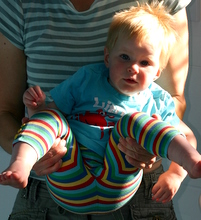

Sixteen months - demo of traditional 'in-arms' hold.
The many variations of this hold include supported against the chest over sinks and bowls, held at knee height over toilets and potties, dangled low over grass and soil, sat facing forwards or backwards in your lap, supported while breastfeeding, and of course, sitting on a potty or toilet.
The Big People Are In Charge
Before you get started, remember this:
This is not the same as toilet training a pre-schooler. The emphasis is very much on the carer recognising or anticipating a need and responding to it rather than the child doing everything independently. This is reflected in baby pottying terminology. We talk about 'catches' and 'misses' - the responsibility of the carer, rather than 'accidents' - the responsibility of the child.
Helpful Links
Benefits of baby-led pottying / ec
Best clothing for pottying / ec
Pottying / ec holds and positions
When to offer the potty (make your own luck)
How to entertain your baby on the potty
Evening pre-emptive wee / lift / dream pee
Quick start guide to night time pottying / ec
Why night nappies and night pottying / ec are a great combination
Your experiences: Why other parents started pottying and how they got on.
How Do Nappies Fit Into This Picture?
Don't worry! You can embrace baby pottying and still use nappies.
It's unrealistic to expect to catch everything in a potty from day zero, and our lives aren't very well set up for uncontained misses. But your nappies needn't be actual nappies - that's why we often refer to them as 'waterproofing' or 'back-up'. Of course, you can use a disposable or a cloth nappy, but you might choose something lighter, like training pants, or one-wet pants (waterproof pants that contain one wee), or Flaparaps (my drop flap nappies), or even an absorbent pad that saves the carpet but sacrifices the trousers.
Using a potty 'full time' is more of a mindset than anything. If you treat your back-up as back-up (i.e. you pretend your child isn't wearing it and you deal with a miss immediately) you get peace of mind while still paying attention.
Or you can use a potty 'part time'. This where you teach your child that both potty and nappy are acceptable toileting options. When they're wearing a nappy, you act as any other nappy using parent. But you also use a potty - either at set times (maybe nappy changes, or after meals, or in response to certain signals) so they get familiar with pottying positions, learn to control their sphincters and recognise their bodies' signals.
Go Nappy Free!
All of the time.
Or some of the time.
Or hardly at all.
But give it go!
Read about how to start or come for tea in my virtual kitchen and I'll show you.
The End Game
Managing Your Expectations
Baby pottying is a fine strategy in it's own right - keeping a baby clean, protecting him from nappy rash, making potty use a familiar activity from the baby days, showing him that he's important enough for you to respond to his needs, developing your two way communication etc. But you probably want to know how it all ends.
You want to know, if you take this approach, when your child will be potty trained in the traditional sense: that is, able to take responsibility for their own toileting. So, they'll either tell you in advance that they need to go, or simply take themselves. Reliably. Every time.
It's that last condition that takes the time: 'Reliably.' 'Every time.'
When Will My Child Be Potty Trained?
70-90% Done: Any time after their first birthday
Don't underestimate how valuable this stage is. Yes, you'll still be using back-up (at least some of the time), and yes you'll still be in charge most of the time, but...
You'll have fewer misses, they'll rarely be dirty, and your child will be practicing at the edge of their capabilities. As they become more capable, you can help them to become more reliable.
If you've managed to avoid conditioning your child to use a nappy, when you use back-up and it will be just that: back-up. Your child will be equally as reliable in nappies or pants or with a bare bottom, because they're responding to their body not their clothing.
So you can waterproof them for car journeys and play centres because you know that they'll still tell you in advance if they possibly can. That nappy is not a wearable toilet - it's just back-up.
100% Reliable. Every time: Nearer to their second birthday.
Say, 18 months plus.
This probably won't happen like magic. At some point you'll need to make a decision. Decide that you no longer need nappies and actively teach yourself and your child to manage without them.
Reliably. Every time.
(This step is mainly for you, actually....)
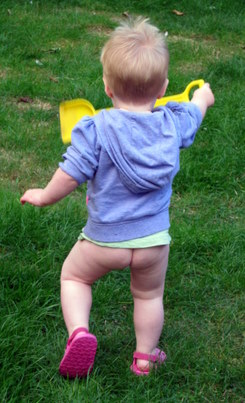
Fifteen months - who wouldn't want a bare bum when it's warm enough?
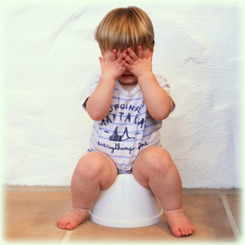
Potty Training for Toddlers: Understand how your toddler learns.
Too vague! Where are the examples?
Fine. Examples from my own life:
My first daughter didn't wear nappies from the day I found out that I could use a potty instead - when she was 6 months old. I invented various absorbent cloth alternatives (special trousers, booster pads) to cope with the infrequent misses. She was done day and night by the time she was two (she was at nursery three days a week and they weren't very well set up for independence before that age).
My second used Flaparaps during the day and disposables at night. She refused to wear either from before her second birthday, and I had no need to get into a battle over it. We declared her done, and that was that.
My third wore Flaparaps day and night. We abandoned them in the day at 18 months and at night not long after. Why so much earlier than her sisters? Because I realised that I needed to help her get from 70-90% reliable to all done.
My fourth is still going*. She's just turned 18 months and all our ducks are in a row. She's 80% reliable, hasn't soiled her pants for a long long time and we only bother with waterproofing her bottom if it would be difficult to deal with a miss. She tells me in advance when she can, or as she's wetting her pants if she gets taken by surprise. She's usually bare bottomed at night and we're well set up to deal with the once-a-fortnight wet bed. Time for me to step up and help her finish off.
*Update: By 22 months she was done. Full days on the trains in London, 6 hour drives for holidays, daily tootling and pootling - no need for nappies. Still the occassional accident linked to teething, but we took it all in stride! Nights were reliable too; She'd wake in the late evening and call if she needed to go to the toilet.
Are my children exceptional?
Not at all! I think they're about average for the UK - and I've spent seven years in the (online) company of other baby pottiers, so I have a good feel for how things progress in this country.
Why does the country matter? Because with a lifestyle choice like this, culture plays a big part. From clothing, to carpets, to diet, to childcare, to in-laws expectations, to funny looks from friends. They all influence the way you live your life - and this is an every day thing. Every day you teach your child what you expect of them - and when we adapt this traditional approach to fit our sanity and social lives it's rare to declare ourselves 'done' before 15 months.
So, for the UK, at 18 to 24 months - I think we're about average.
Quick Calculations and Your Social Conscience
How you handle nappies and potty training is a purely personal decision, based on many factors (including the weather). But individual decisions have global repercussions when they impact the environment.
The average age to conventionally potty train in the UK is creeping towards three. So I'll use 'three years' in these quick calculations, and I'll assume an average of 'two years' if you do baby-led potting.
Sometimes it's helpful to wonder what the world would look like if everyone made the same decisions as you. "Be the change you want to see in the world" and all that jazz. But 'everyone' is quite a fuzzy concept, so I've found a few numbers to make it more tangible.
'Everyone with a newborn' means 700,000 families in England and Wales each year.
'Everyone using nappies' in England and Wales send 9 million disposables to landfill every single day.
Now assume that 'everyone' used baby-led pottying and the average age for completion dropped from three years to two. That alone would mean 3 million fewer nappies in landfill per day and over a billion fewer nappies per year. If people switched to cloth training pants at 18 months we'd save another half billion nappies a year.
We'd make financial savings too. At 10p per nappy, a billion nappies are worth £100 million - and that's before you add wipes or sudocream into the equation.
£100 million per year.
That's worth saving, isn't it?

Twelve months and starting to make savings.
Don't Wait. Get Started!
This introduction was intended to help you understand what's possible, and, if you're anything like me, leave you wondering how this never occurred to you before.
To actually get started with baby pottying, you need practical advice and a dollop of confidence.
If you're an academic learner, read my 'How To Get Started With Baby Pottying Today!' guide and get cracking!
If you prefer conversational learning, and the opportunity to ask questions, you might get better results by joining my online workshop.
Be inspired! This is just the begining....
Sounds Improbable
"Give me proof!" I hear you cry.
Will a few photos do for now? Contribute a photo.

3 weeks

6 weeks

4 months

4 months

6 weeks
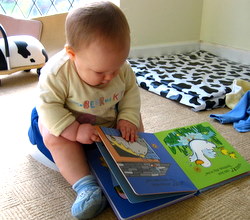
8 months
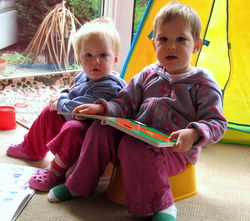
Practicing

5 months
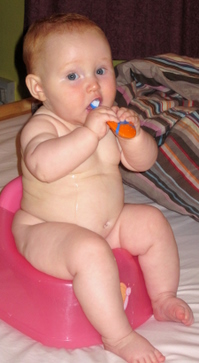
7 months

8 months
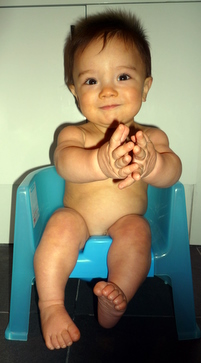
8 months
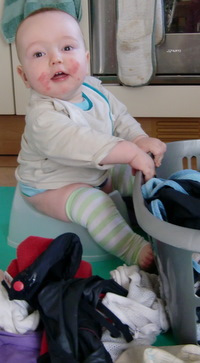
10 months

11months
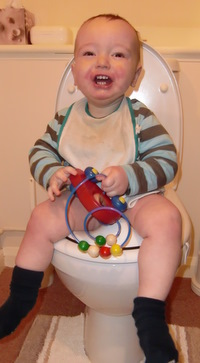
12 months
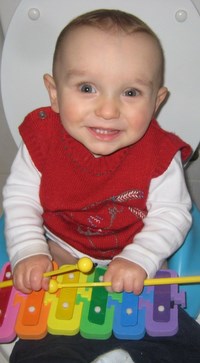
12 months, bumbo toilet seat
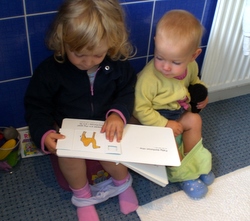
Nearly 3 and 15 months
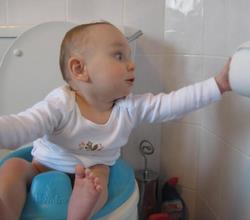
12 months, bumbo toilet seat

13 months, potty in the park

13 weeks - over bowl
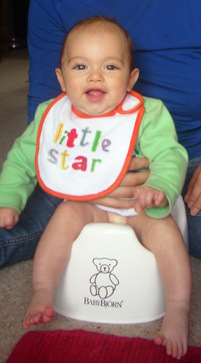
3 months - baby bjorn
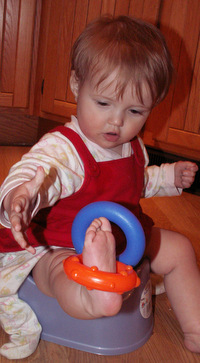
12 months - quoits!

12 months - reading

15 months - reading on the loo

8 months - ted also on pot
Contribute a Photo
I'd love this page to be filled with photos of different babies of all ages in all sorts of pottying positions.
If you have a photo you would like to contribute, please email it to me ( jenn@bornready.uk ) and I'll add it to the page.
If your photo reveals too much, I'll draw on a pair of pants!

